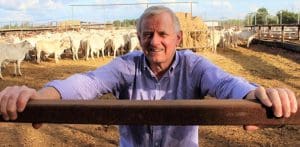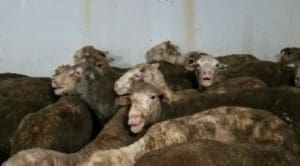
ALEC chairman Simon Crean
AUSTRALIAN live sheep exporters will next year impose a three-month moratorium on Middle East shipments during the Northern Hemisphere summer.
The Australian Livestock Exporters’ Council said the exporters wrote to Western Australian sheep producers today, advising them of the new three-month moratorium.
ALEC independent chairman Simon Crean said the moratorium would provide certainty to sheep producers who supply the trade and is just one initiative among wider ranging industry reforms.
“This is about maintaining and growing a strong, viable nine-month-a-year live sheep trade and, more broadly, securing the future of Australia’s livestock export industry,” Mr Crean said.
The self-imposed moratorium decision follows significant community and political pressure to end Middle East sheep shipments during the Northern Summer as a prelude to a general phasing out of long-haul shipments. Several bills are currently before Federal Parliament to phase out the trade.
Some exporters have also questioned the viability of such Middle East Northern Summer shipments under new heat stress and loading density rules. Recent government review and restrictions on the trade were initiated after video footage of Middle East voyages experiencing heavy losses due to heat stress was released by animal rights body Animals Australia.
The moratorium will take effect from 1 June 2019, and will mean no shipments of Australian sheep will depart any Australian port for the Middle East during the highest heat stress risk period of the northern summer. At this stage the moratorium is intended to apply only to sheep.
New technology needed to address heat stress

Live sheep under heat stress during a Middle East shipment last year.
An ALEC statement today said exporters will observe the moratorium while the industry develops new technology which could, in the future, address the heat risk challenges associated with shipments in June, July and August.
“Potential solutions being developed by the export research and development corporation, Livecorp, include improved detection and avoidance of temperature extremes, and on-board dehumidification,” Mr Crean said.
In addition to the moratorium, sheep exporters have agreed to initiate a program of transparency and on-board monitoring, to be designed and developed by LiveCorp. The program will improve transparency and communication with producers with regard to on-board conditions and the performance of shipments, ALEC said.
ALEC said in the seven years from January 2010 to December 2017, Australia’s live sheep exports to the Middle East contributed $2.06 billion to the Australian economy, exporting 16.6 million sheep over 258 voyages.
While more than three-quarters of Middle East sheep voyages in the past seven years have recorded mortalities of less than one per cent, the majority of the 20 voyages when mortalities were above 1.5pc occurred in the June to August northern summer period.
“The live sheep trade to the Middle East needs to be reset,” Mr Crean said.
“June to August sheep exports to the Middle East are worth $55 million per annum, so the moratorium will, without any doubt, impact farm gate returns. But this decision shows the genuine care exporters have for livestock – values we share with producers – and our commitment to the industry’s future.”
Code of Conduct will enforce moratorium
The moratorium will be enforced via ALEC’s newly established mandatory Code of Conduct.
Mr Crean said exporters know that participating collectively through ALEC in industry governance and reform builds consensus and promotes accountability.
“That’s why they have formally supported ALEC’s new mandatory Code of Conduct and the new Industry and Conduct Advisory Committee – to foster an industry culture that builds trust in the trade.”
ALEC said the purpose of its mandatory Code of Conduct, which was endorsed by the board and ALEC members in September 2018, is to:
Drive cultural change in the industry;
Require members to proactively address and report on animal welfare issues, evaluating performance for further improvement;
Earn community trust; and
Ensure the highest standards of integrity, accountability and transparency are maintained by ALEC members and that members are meeting their regulatory obligations.
All members of ALEC must adhere to the mandatory Code of Conduct. Failure to adhere to the code may result in suspension or revocation of membership. Details of sanctions will also be published online.
The ALEC board has also endorsed the establishment of the ALEC Industry and Conduct Advisory Committee. The objectives of the committee are to:
Undertake incident analysis and to advise on strategic development of policies to enhance the livestock export industry regarding animal welfare;
Provide independent and expert advice on potential breaches of the Code of Conduct and/or concerns about an ALEC member’s behaviour and recommend corrective actions if necessary, and;
Demonstrate ALEC’s commitment to animal welfare, compliance with laws and regulations, appropriate conduct, business ethics and acceptable standards to the broader community.
The Industry and Conduct Advisory Committee will provide independent advice as an advisory committee to the ALEC board. Work is currently underway to establish the committee which is expected to be operating by April 2019. Importantly, the Industry and Conduct Advisory Committee is an independent committee in terms of ALEC’s governance structure and will report direct to the chairman of the ALEC board.
LGAP also part of industry reforms
Mr Crean said it is also important to note these reforms alongside ALEC’s ongoing commitment to implement the Livestock Global Assurance Program (LGAP) which will improve animal welfare, and control and traceability within the livestock export supply chain.
ALEC said LGAP is the outcome of many years of industry research and will be governed by an independent board. The purpose-built program aims to provide animal welfare outcomes that are equivalent to, or improve upon, those provided by the Federal Government’s Exporter Supply Chain Assurance System (ESCAS). LGAP seeks to drive greater efficiencies and effectiveness in delivering those outcomes by extending accountability to the facilities in the supply chain, so that the in-market feedlots or abattoirs that actually own the livestock share the responsibility for ensuring their welfare, ALEC said.
“I’m determined to continue to lead these reform processes, which is why I accepted exporters’ endorsement for a further two-year term as independent chairman at our recent AGM,” Mr Crean said.
“Our newly appointed chief executive officer Brett Pointing brings exceptional skills and experience in driving cultural change.
“He knows generational succession is key in any cultural change and the new ALEC board reflects that,” he said.
“While the challenges facing our industry cannot be underestimated, neither can our determination to respond to them proactively and secure the industry’s future.”

HAVE YOUR SAY